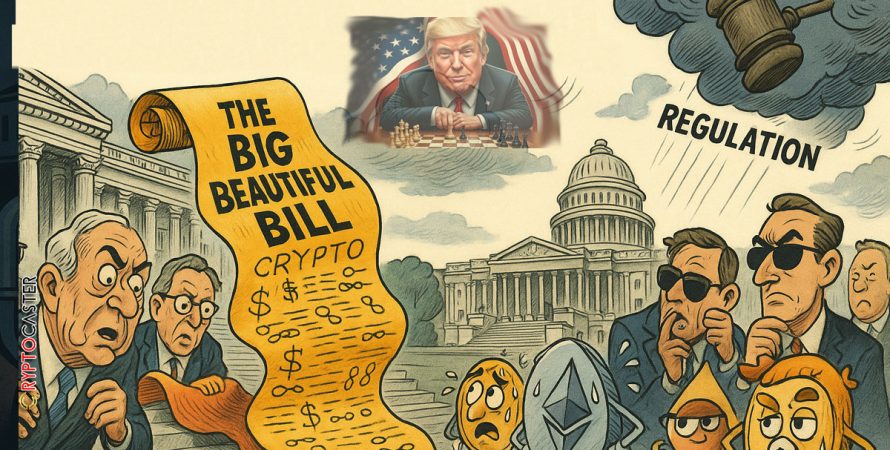By Capitol Hill Correspondent — for Cryptocaster.world
“They finally named it something beautiful before burying it under compliance.”
— a pseudonymous crypto dev, moments after the House vote.
For over a decade, crypto navigated U.S. policy like a drifting ship—occasionally spotted by regulators, occasionally fired upon, but mostly left to its own devices. Then came the Big Beautiful Bill, a landmark piece of legislation whose name sounds like a punchline, but whose implications are anything but.
Stay in the know on crypto by frequently visiting Crypto News Today
Unveiled with bipartisan flair, sharpened behind closed doors, and passed through Congress with surprising velocity, the bill is being hailed as crypto’s coming-of-age moment—and by some, as its domestication.
But what does it actually do? And is it truly “beautiful” for crypto, or a velvet-wrapped regulatory hammer?
CryptoCaster Quick Check:
A Bill Wrapped in Swagger
The name “Big Beautiful Bill” didn’t originate on Capitol Hill. It was coined—half-jokingly—by a Libertarian-leaning lawmaker known for peppering speeches with Trumpian bravado. The phrase stuck. After all, Washington hadn’t passed a comprehensive digital asset framework in over 15 years of Bitcoin’s existence.
The bill itself, officially titled the Digital Commodity and Innovation Protection Act, does three monumental things:
- Clarifies Jurisdiction — Designates the CFTC as the primary regulator for most digital assets deemed commodities, marginalizing the SEC’s often controversial crypto enforcement blitz.
- Defines “Decentralization” — Establishes thresholds to determine if a token or protocol is sufficiently decentralized to escape securities classification.
- Builds Stablecoin Standards — Introduces a clear licensing path for stablecoin issuers, requiring proof of reserves, 1:1 backing, and transparency audits.
It doesn’t end there. Exchanges now face a federal registration requirement, DAOs get an optional legal wrapper, and smart contract deployers—under certain conditions—can be exempt from liability.
Crypto Market Reaction: A Mixed Pour
The ink wasn’t dry before Bitcoin jumped 3%, then slid back into volatility. Altcoins pumped, then slumped. What stuck was sentiment.
Brian Armstrong of Coinbase tweeted, “This is the clarity we’ve been waiting for. Let’s build.”
Meanwhile, the Ethereum community was cautious. Under the bill, ETH may now be legally classified as a commodity—vindicating years of market consensus—but other L1s could fall into murky waters, especially those with high pre-mines or centralized governance.
And for the shadowier corners of the ecosystem—think meme coins, exotic derivatives, or DeFi degen protocols—compliance could mean extinction or exile.
Builders Get a Playbook (Sort Of)
Until now, developers launched tokens with fingers crossed, hoping they wouldn’t wake up to a Wells notice. Now, they may have a path: file disclosures, reach decentralization benchmarks, and get public. But that process isn’t cheap—or fast.
Critics argue this will favor well-capitalized players, ossifying innovation and sidelining grassroots projects. Others say that’s exactly what’s needed.
“Crypto can’t keep pretending it’s the Wild West if it wants to build real-world infrastructure,” said former CFTC chair Chris Giancarlo, speaking at a post-vote forum.
DeFi: Still Dancing in Legal Grey
Despite nods toward decentralization, the bill leaves DeFi largely untouched—perhaps intentionally. Protocols that truly lack identifiable control may operate freely. But the moment there’s a team, a token treasury, or governance concentration, scrutiny is inevitable.
As one DeFi founder told Cryptocaster under anonymity:
“We’re reviewing whether to spin up a Cayman foundation or just rebrand as ‘educational software.’ This bill makes one thing clear: U.S. soil is no longer neutral ground.”
Politics: Crypto as a Wedge Issue
Ironically, the bill’s success comes as crypto politics heat up. What was once a fringe issue has now been weaponized across party lines. In the 2024 election cycle, presidential candidates on both sides flirted with pro-crypto platforms.
Republicans hailed the Big Beautiful Bill as a free-market win. Democrats framed it as a consumer-protection upgrade—albeit one with open doors for fintech jobs.
Even Senator Elizabeth Warren, a noted crypto skeptic, issued a cautious statement. “If this bill forces bad actors into the light, then let the sun shine.”
Global Ripple Effect
The U.S. now joins the EU (with its MiCA regulation) and Singapore in crafting serious digital asset legislation. For global firms, the message is simple: pick your jurisdiction wisely.
U.S. exchanges may regain an edge lost to offshore competitors. On the other hand, smaller projects may continue their exodus to crypto-friendly havens—Dubai, Zug, or decentralized nothingness.
So… Is It Actually Beautiful?
The truth: it depends who you ask.
For lawyers and institutions, the bill is a dream realized—certainty, legitimacy, capital inflows.
For cypherpunks, it’s the moment the machine co-opted the movement.
For builders, it’s a signal: “Regulate me gently or I’ll fork myself to freedom.”
Crypto survived its infancy. It survived scandals, scams, and regulatory whiplash. But now, it’s at a new crossroads—no longer unregulated, but not yet tamed.
The Big Beautiful Bill may not kill crypto, but it just might civilize it.
DISCLAIMER:
This article is for informational and satirical purposes only. It is not legal advice, financial guidance, or a covert SEC honeypot. All opinions are those of the author and/or a hallucinated crypto-themed AI entity. Proceed with curiosity, not custody.
If this article brought you clarity, insight, or value—support the work that made it possible.
At CryptoCaster, we report on Web3, crypto markets, and institutional finance with no billionaire owners, no shareholders, and no hidden agenda. While mainstream media bends toward Elon Musk, BlackRock, and JPMorgan narratives, we stay focused on what matters: truth, transparency, and the public interest.
We don’t just cover the headlines—we investigate the power structures behind them. From FTX and Ripple to the quiet push for CBDCs, we bring fearless reporting that isn’t filtered by corporate interests.
CryptoCaster is 100% paywall-free. Always has been. To keep it that way, we depend on readers like you.
If you believe independent crypto journalism matters, please contribute—starting at just $1 in Bitcoin or Ether. Wallet addresses are below.
Your support keeps us free, bold, and accountable to no one but you.
Thank you,
Kristin Steinbeck
Editor, CryptoCaster
Support CryptoCaster: The Unfolding of Money
At CryptoCaster.world, we’re dedicated to bold journalism, sharp insights, and fearless commentary across blockchain, Web3, and crypto markets. Your **Bitcoin contributions** help us stay independent and continue delivering signal over noise.
🚨 CryptoCaster does not offer investment advice. Always DYOR—volatility is real, and risk tolerance matters.
Support our mission. Contribute BTC today.
🔗 Bitcoin Address:
3NM7AAdxxaJ7jUhZ2nyfgcheWkrquvCzRm
Thank you for backing our journalistic lens as we chronicle the Unfolding of Money — a saga still being written in real time.![]()
CRYPTOCASTER HEATMAP







